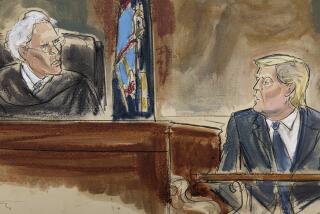Judge: It’s Payback Time for Grasso
- Share via
NEW YORK — Former New York Stock Exchange Chairman Richard Grasso, whose $187.5-million compensation package fed public outrage over skyrocketing executive pay, could be forced to return up to $100 million under a court ruling released Thursday.
State Supreme Court Justice Charles Ramos said Grasso failed to ensure that the NYSE board understood the “magnitude” of his ballooning pay, particularly the more than $100 million in retirement benefits that he quietly accrued in his last few years on the job.
The case was brought by New York Atty. Gen. Eliot Spitzer, who alleged that Grasso stocked the board with cronies, then misled them about how much he was earning. In a May 2004 lawsuit, Spitzer claimed that Grasso breached his fiduciary duties under a state law regulating nonprofit organizations, which the NYSE was at the time.
Grasso has contended that the NYSE board and its compensation committee were made up of top Wall Street executives who were informed of his pay and approved it.
But Ramos rejected those arguments in sharp language, at one point labeling as “shocking” Grasso’s contention that he himself didn’t realize how much he was earning.
“That a fiduciary of any institution, profit or not-for-profit, could honestly admit that he was unaware of a liability of over $100 million ... is a clear violation,” Ramos wrote.
The judge ordered an accounting to determine how much Grasso must return to the exchange, which is now a publicly traded company. Ramos did not stipulate an amount, but Spitzer’s office said the ruling meant Grasso must pay back about $100 million.
Grasso’s lawyers did not return calls for comment, but legal experts said an appeal was likely. Grasso has already asked an appellate court to remove Ramos, saying he has shown in settlement discussions that he could not be “fair and impartial.”
Grasso started at the NYSE as a clerk in 1968, rising through the ranks to become chairman and chief executive in 1995. He was forced out in 2003 after the disclosure of his pay package made him a national symbol of Wall Street greed.
Although the court ruling has no direct effect on compensation policies for managers running public companies, the episode helped focus public attention on escalating executive salaries, said Amy Borrus, deputy director of the Council of Institutional Investors.
“This is good news for investors,” Borrus said. “When you think about it, the shock of learning the totality of Dick Grasso’s compensation helped increase pressure for full disclosure of compensation, so investors can see the full panoply of pay and benefits that executives receive. It was really a wake-up call to shareowners.”
“The Grasso decision sets a standard,” said Richard Ferlauto, director of pension and benefits policy for the American Federation of State, County and Municipal Employees, which has emerged as a leading critic of excessive executive pay. “The expectation will be that when the money was ill-gotten, or gotten in a way that hasn’t been disclosed, shareholders will expect to get the money back.”
Spitzer’s suit focused on retirement benefits that Grasso accrued starting in 1999 under a supplemental executive retirement plan, a special pension fund that many corporate executives receive even as their companies jettison pensions for rank-and-file workers.
Spitzer claimed that the board was given only cursory information about the retirement benefits and didn’t realize that Grasso was accumulating tens of millions in the supplemental pension plan. Moreover, Spitzer said, NYSE directors were hesitant to challenge Grasso for fear that he would turn the regulatory arm of the NYSE against their companies.
Ramos’ ruling, which was dated Wednesday and released Thursday, did not address Spitzer’s central claim that Grasso’s pay was unreasonable. That matter will be addressed at a trial, which has been postponed as a result of Grasso’s demand for a new judge.
Ramos on Thursday also rejected several of Grasso’s cross-claims against the NYSE, including an allegation that Grasso’s successor, John S. Reed, defamed him. Ramos also turned down Grasso’s claim that he was technically fired by the board and entitled to termination pay.
“It is a very strong condemnation of Grasso’s conduct,” said Zachary Hummel of the Bryan Cave law firm in New York.
An appeal probably would center on the issuance of the ruling without a trial at which Grasso could have laid out his evidence, experts said.
Before this week’s ruling, Ramos had issued a series of unfavorable decisions for Grasso, including a plan for a bench trial at which he, rather than a jury, would determine whether Grasso’s pay was reasonable.
Times staff writer Kathy M. Kristof contributed to this report.
More to Read
Inside the business of entertainment
The Wide Shot brings you news, analysis and insights on everything from streaming wars to production — and what it all means for the future.
You may occasionally receive promotional content from the Los Angeles Times.









